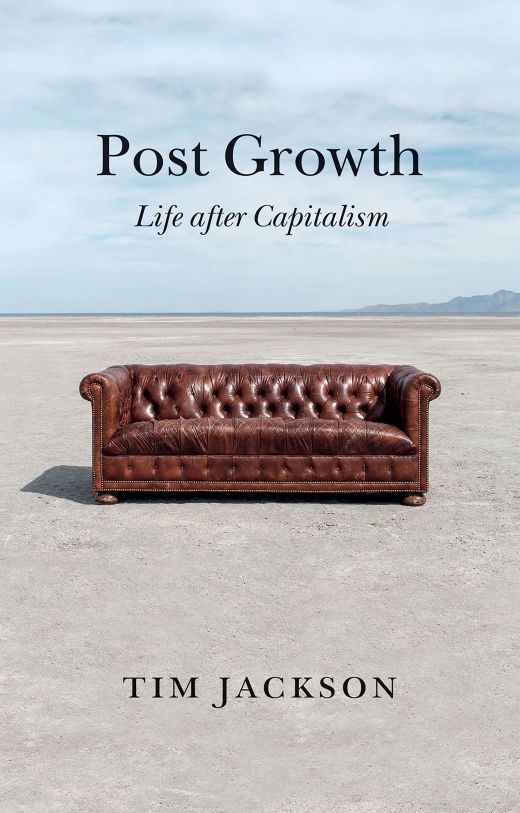Tim Jackson's book marshals great thinkers, poets and evidence to argue we must abandon our destructive notion of economic growth.
Review of Post Growth: Life after Capitalism
Author: Tim Jackson
Reviewed by David Towell
Tim Jackson published his earlier book, Prosperity Without Growth: Economics for a Finite Planet in 2009. My review includes his key definition of a prosperity beyond material satisfactions. Real prosperity:
''resides in the quality of our lives and the health and happiness of our families; the strength of our relationships and our trust in the community; our satisfaction at work and our sense of shared meaning and purpose... our potential to participate fully in the life of society.''
I have subsequently used this quote many times.

As its title suggests, Jackson's new book returns to these themes with great intensity. Twelve years on, the need for radical change is considerably more urgent. Capitalism has failed us: we must move quickly (that is, not by incremental improvements on the status quo but rather through energetic transformation) to create human societies that flourish in the context of ecological limits. Through the Coronavirus crises, we have also been shown possibilities. Suddenly governments that worship austerity found that there is a 'magic money tree' and they could invest heavily in strengthening public services and sustaining employment when the situation demands this. (Of course, wise governments could have used this huge investment to create what we need for the future, not just keep things going.) At the same time, through the deprivations of 'lock-down', citizens discovered that we can reduce our carbon footprint, clear our cities from pollution, and, for some at least, cut journeys to the office. We also discovered who the 'key workers' in our societies are. And perhaps through our sense of loss, we may have learnt more about what is really important in our lives. In short, that there can be a better 'life after capitalism'.
In this new book, Jackson pursues this agenda through an impressive exploration of ideas and stories from the work of leading thinkers and activists, mostly thinking activists! These include Robert Kennedy, JS Mill, Amartya Sen, Ludwig Bottsmann, Lynn Margulis, Hannah Arendt, Wangari Maatkai, Thich Nhat Hanh, William Wordsworth and Emily Dickinson. Politicians, economists, scientists, philosophers and poets. All are essential to this exploration.
He starts and finishes with Robert Kennedy. Back in 1968, the younger Kennedy, shortly before his assassination, made a speech that included a very radical proposition for its time: he asked whether GDP (Gross Domestic Product) was any way of sensibly measuring national progress. It isn't. But fifty years later, economists and those in the media who 'explain' economics to us still haven't got the message. Shortly after, in 1972, the 'Club of Rome' was founded to advance the argument that there are natural limits to growth. It seems that capitalism is still trying to prove this point through global destruction. In both books, Jackson sets out the unanswerable case against casino capitalism effectively and exhaustively. As he says, 'Capitalism is a catalogue of system errors.' I won't repeat all this except to quote another paragraph that summarises an alternative vision:
''Tomorrow's economy will be built around renewable and 'regenerative' technologies; around fair wage deals and transparent governance; around the protection and restoration of social and environmental assets rather than their systematic destruction; around enterprise in the service of community and in harmony with nature.''
One story illustrates this argument very well. Wangari Maathai is a Kenyan woman awarded the Noble Peace Prize in 2004. She grew up in a village where the community respected the importance of trees to the local habitat, offering natural protection to other aspects of agriculture. 'Progress' in Kenya was associated with more exploitative farming methods that demolished the trees for short-term gain. She led a campaign, mobilising poor women as tree planters, to reverse this destruction on a large scale... and then mobilising poor people politically to take back power from the exploiters. In Kenya, it became possible to glimpse that a different future is possible.
I say that Post Growth is intense. It is also profound. Jackson's exploration of Hannah Arendt's work (especially The Human Condition) but also the poets, notably Emily Dickinson, is most important here. Beyond capitalism we can, as people and communities, become much more than we often are now as workers and consumers. The quote with which this review begins points the way to a richer, more multi-dimensional and balanced way of being in the world. Because we are worth it!
The vision here is clear and powerful. But the preoccupation with greed and growth is deeply engrained in our system. A very small minority of the most rich and powerful like it this way. They pull the strings for many others who protect their status. If it is to be system change not climate change, we shall have to fight for it. Here Jackson calls in aid the Vietnamese Buddhist philosopher, Thich Nhat Hahn. (He also closes a circle here in telling us that Hahn met Robert Kennedy to encourage the latter's opposition to the Vietnam war.) Of course, 'Engaged Buddhism' preaches non-violence while promoting compassionate action. Now is the time!
The publisher is Policy Press.
Post Growth: Life after Capitalism © Tim Jackson 2021.
Review: Post Growth: Life after Capitalism © David Towell 2021.
All Rights Reserved. No part of this paper may be reproduced in any form without permission from the publisher except for the quotation of brief passages in reviews.
nature & economics, social justice, Sustainability, England, Reviews